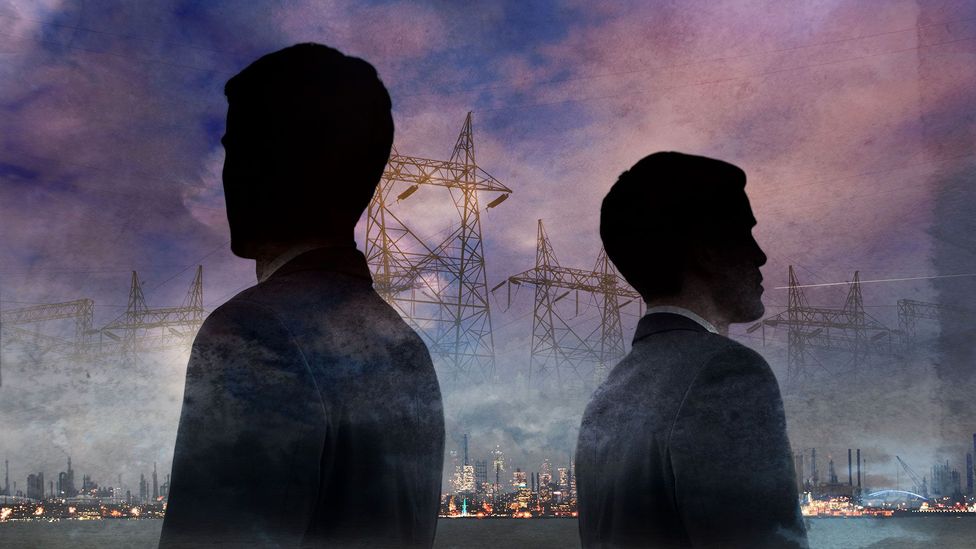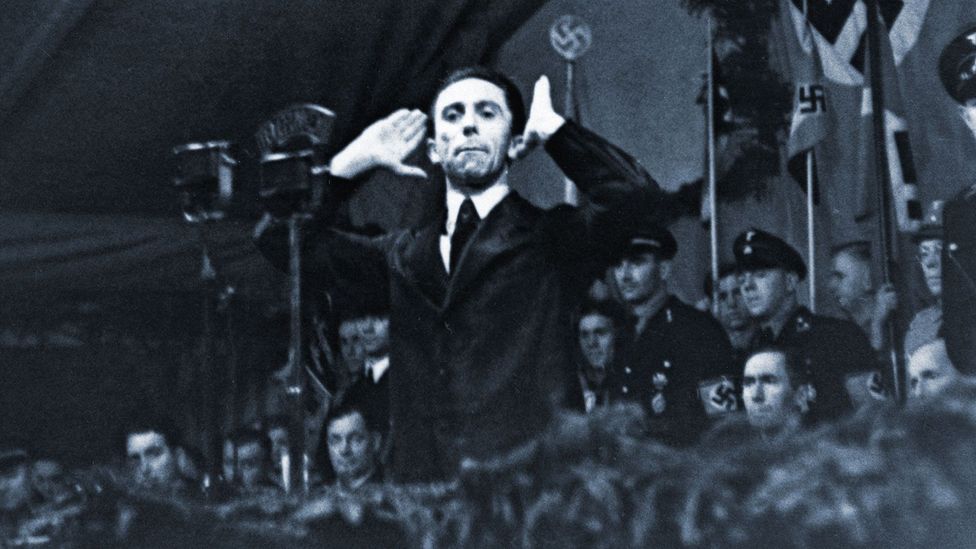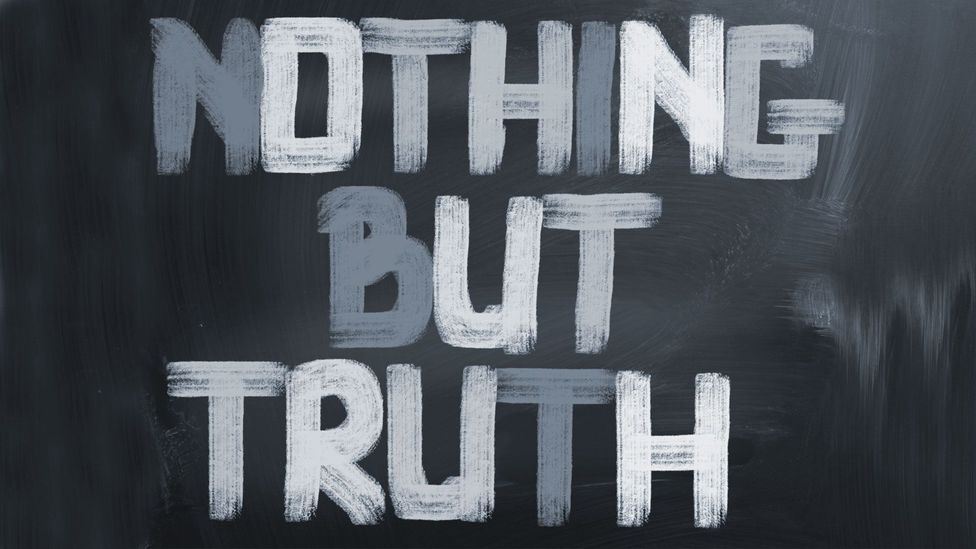After Reading the Chapter, Why Do You Believe That This Story Seems Particularly â€å“trueã¢â‚¬â to Rat?
How liars create the 'illusion of truth'
(Image credit:
Getty Images
)

Repetition makes a fact seem more than true, regardless of whether it is or non. Understanding this effect tin can aid you lot avoid falling for propaganda, says psychologist Tom Stafford.
"Repeat a lie often enough and it becomes the truth", is a law of propaganda often attributed to the Nazi Joseph Goebbels. Amongst psychologists something similar this known as the "illusion of truth" effect. Here's how a typical experiment on the effect works: participants charge per unit how true trivia items are, things similar "A prune is a dried plum". Sometimes these items are true (like that one), but sometimes participants encounter a parallel version which isn't true (something like "A date is a dried plum").
After a break – of minutes or even weeks – the participants practice the procedure again, but this fourth dimension some of the items they rate are new, and some they saw before in the offset phase. The cardinal finding is that people tend to rate items they've seen before every bit more likely to be true, regardless of whether they are truthful or non, and seemingly for the sole reason that they are more familiar.
Then, hither, captured in the lab, seems to be the source for the proverb that if you echo a lie often enough it becomes the truth. And if y'all expect around yourself, you may starting time to recollect that everyone from advertisers to politicians are taking advantage of this foible of human psychology.
But a reliable effect in the lab isn't necessarily an important issue on people's real-earth behavior. If yous really could make a lie audio true by repetition, there'd be no need for all the other techniques of persuasion.

The 'illusion of truth' can be a dangerous weapon in the easily of a propagandist like Joseph Goebbels (Credit: Getty Images)
One obstacle is what you already know. Fifty-fifty if a lie sounds plausible, why would you prepare what you know aside simply considering yous heard the lie repeatedly?
Recently, a team led by Lisa Fazio of Vanderbilt University ready out to examination how the illusion of truth effect interacts with our prior noesis. Would it affect our existing noesis? They used paired true and un-true statements, but also dissever their items co-ordinate to how likely participants were to know the truth (then "The Pacific Ocean is the largest body of water on Earth" is an example of a "known" items, which also happens to be true, and "The Atlantic Bounding main is the largest ocean on Earth" is an united nations-true item, for which people are likely to know the bodily truth).
Their results show that the illusion of truth effect worked but as strongly for known as for unknown items, suggesting that prior knowledge won't prevent repetition from swaying our judgements of plausibility.
To cover all bases, the researchers performed one written report in which the participants were asked to rate how truthful each argument seemed on a half dozen-indicate scale, and 1 where they merely categorised each fact as "truthful" or "fake". Repetition pushed the average detail upward the six-point scale, and increased the odds that a argument would exist categorised as true. For statements that were actually fact or fiction, known or unknown, repetition fabricated them all seem more than believable.

Repetition tin can even make known lies sound more believable (Credit: Alamy)
At first this looks like bad news for human rationality, merely – and I can't emphasise this strongly enough – when interpreting psychological scientific discipline, you take to look at the actual numbers.
What Fazio and colleagues actually establish, is that the biggest influence on whether a argument was judged to exist truthful was... whether it actually was true. The repetition issue couldn't mask the truth. With or without repetition, people were yet more likely to believe the actual facts as opposed to the lies.
This shows something primal about how nosotros update our beliefs – repetition has a ability to make things audio more true, even when we know differently, but it doesn't over-ride that knowledge
The side by side question has to exist, why might that be? The reply is to do with the try information technology takes to existence rigidly logical about every piece of information yous hear. If every fourth dimension yous heard something y'all assessed it against everything you already knew, you'd nevertheless be thinking near breakfast at supper-time. Because nosotros need to brand quick judgements, we adopt shortcuts – heuristics which are right more ofttimes than wrong. Relying on how often yous've heard something to judge how true something feels is but ane strategy. Any universe where truth gets repeated more than oft than lies, even if just 51% vs 49% will be one where this is a quick and dirty rule for judging facts.

The illusion of truth is not inevitable – when armed with noesis, we can resist information technology (Credit: Getty Images)
If repetition was the but thing that influenced what we believed we'd be in trouble, but information technology isn't. We tin can all bring to conduct more all-encompassing powers of reasoning, just we need to recognise they are a express resource. Our minds are prey to the illusion of truth effect considering our instinct is to use brusk-cuts in judging how plausible something is. Oft this works. Sometimes it is misleading.
Once nosotros know nigh the event we can guard against it. Part of this is double-checking why we believe what we do – if something sounds plausible is it considering it really is truthful, or take we only been told that repeatedly? This is why scholars are so mad about providing references - and then we can track the origin on any claim, rather than having to accept it on religion.
Merely part of guarding against the illusion is the obligation it puts on us to terminate repeating falsehoods. We live in a globe where the facts matter, and should matter. If you lot echo things without bothering to check if they are true, you are helping to make a world where lies and truth are easier to misfile. So, delight, remember earlier you repeat.
--
Tom Stafford'south ebook on when and how rational argument can change minds is out now. If y'all have an everyday psychological phenomenon yous'd similar to encounter written about in these columns please get in impact with @tomstafford on Twitter, or ideas@idiolect.org.uk.
Bring together 700,000+ Hereafter fans by liking us on Facebook, or follow united states on Twitter, Google+, LinkedIn and Instagram.
If you lot liked this story, sign up for the weekly bbc.com features newsletter, called "If You Only Read half dozen Things This Week". A handpicked selection of stories from BBC Future, Earth, Culture, Majuscule, Travel and Autos, delivered to your inbox every Friday.
quickhishadinin1961.blogspot.com
Source: https://www.bbc.com/future/article/20161026-how-liars-create-the-illusion-of-truth
0 Response to "After Reading the Chapter, Why Do You Believe That This Story Seems Particularly â€å“trueã¢â‚¬â to Rat?"
Post a Comment